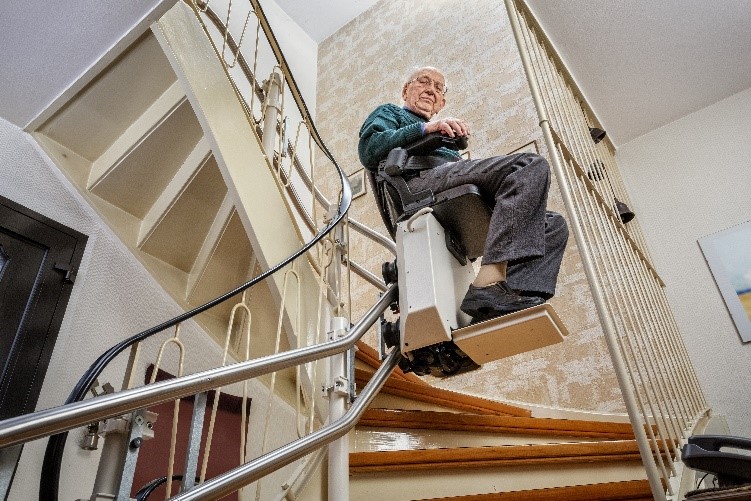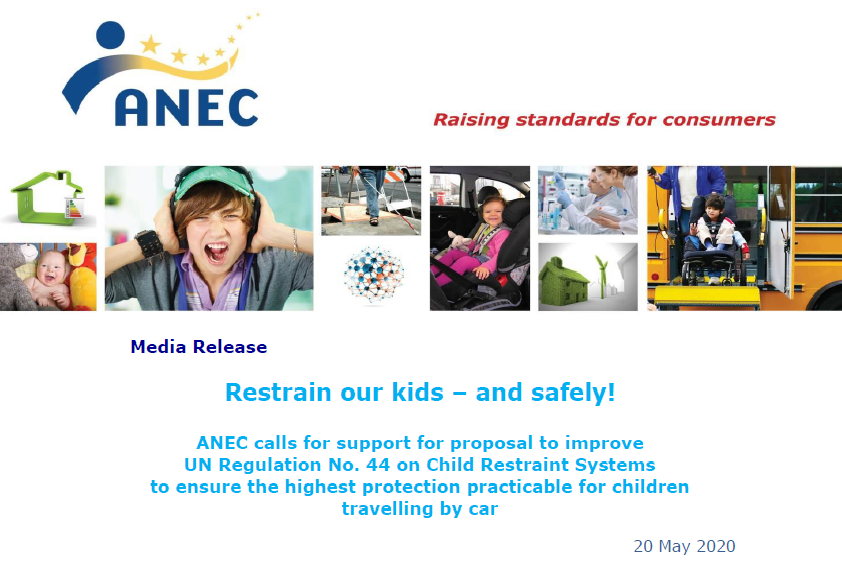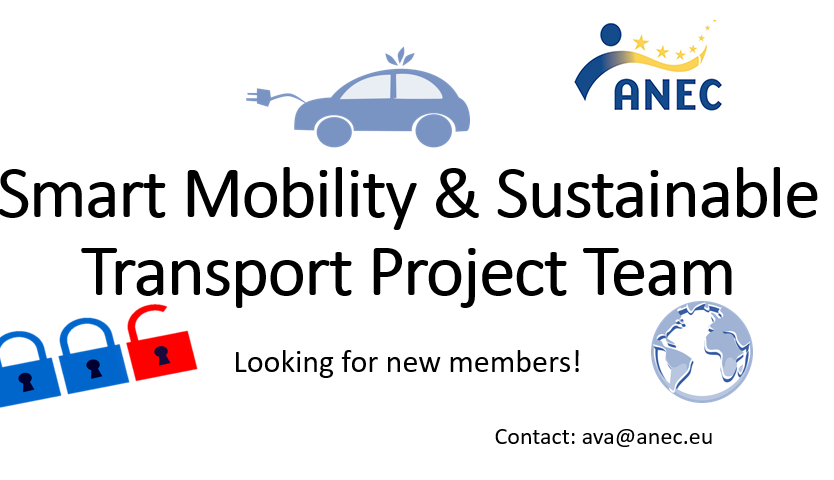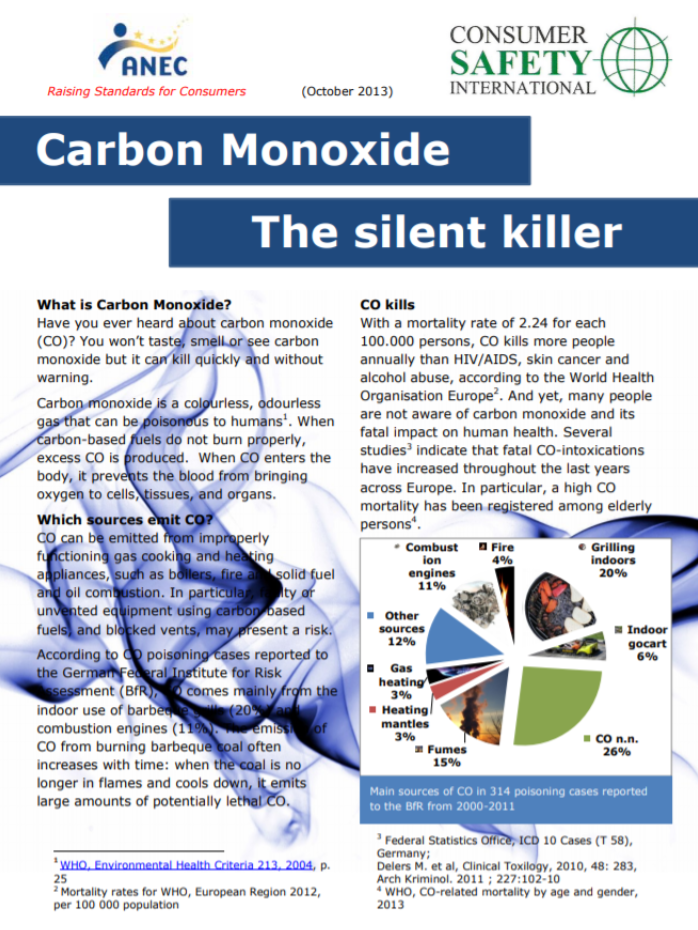Lead Story
An urgent CWA for community face masks
Further to the request of the European Commission (EC) for a standards deliverable to be made urgently available for community face masks, a CEN Workshop on community face coverings has been established. It is tasked with delivering a CEN Workshop Agreement (CWA) by 15 June 2020, following a kick-off meeting on 26 May. The main participants in the Workshop are the national standards bodies which have developed a specification for community face masks or have one under development. ANEC has offered its expertise and help if needed by the Workshop. We plan to participate in the development of a more formal CEN standard, which will be based on the CWA, and developed through the usual technical committee process.

Horizontal
ANEC comments on revision of Machinery Directive
The EC is planning the revision of the Machinery Directive (2006/42/EC) which applies to consumer products such as gardening equipment and stairlifts. Harmonised Standards can be used to provide presumption of conformity with the legal requirements. ANEC has developed a position paper ahead of the expected revision.
The discussions on the revision are going on, focusing on the need to take into account technological developments in security and Artificial Intelligence. As a lack of security can lead to a product being hacked and so put consumer safety at risk, we are supporting the notion that software updates be considered “substantial modifications” if they impact on safety. We believe the learning capabilities possible through Artificial Intelligence should mean it is treated similarly.
More broadly, these learning capabilities must ensure the product acts safely and ethically in scenarios not foreseen at the time of its initial putting into use.
New technologies also have an impact on how consumers get information on the product they buy. In our opinion, it is important to offer both on-line and paper formats as not all consumers are routinely connected to the Internet.
The target audience and conditions of use must be the decisive factor when prescribing the manufacturers’ obligations on content, media and format of the instructions.
The revision of the Machinery Directive, foreseen for this year, will be postponed to 2021 as a result of the pandemic. A welcome consequence will be added time to discuss and find agreement among stakeholders on the more contentious topics.

Use conditions in standards
ANEC has joined CEN–CENELEC/BTWG 15 which is tasked with preparing contributions to future editions of ISO/IEC Guide 51 ‘Safety aspects — Guidelines for their inclusion in standards’ and the Commission Blue Guide on the implementation of EU product rules.
To that end, BTWG 15 will discuss and possibly prepare proposals to the CEN and CENELEC Technical Boards on “Use Conditions” (intended use, (reasonably foreseeable) misuse, reasonable foreseeable use, …), building on and complementing the current definitions of ISO/IEC Guide 51:2014. The work will also take into account the interpretations used in the European Regulatory framework. The fact that the definitions and/or interpretations of “use”, “intended use”, “foreseeable misuse” etc in standards and European legislation, and between the ISO/IEC Guide 51 and the Blue Guide, differ can result in standards not being cited in the OJEU. Following the kick-off meeting, which took place on 6 May, a first draft was prepared, on which ANEC sent preliminary comments. The next meeting of CEN-CENELEC BTWG 15 will take place in early June.
HAS assessment of draft ENs under GPSD
Following agreement between EC DG GROW Unit B.3 ‘Standards for Growth’ and EC DG JUST Unit E.4 ‘Product Safety and the Rapid Alert system’, draft Harmonised Standards intended to support General Product Safety Directive (GPSD) mandates have undergone an assessment process by a HAS Consultant since 1 June 2020.
The system of HAS Consultants came into force on 1 April 2018 for product standards supporting vertical EU legislation (toys, electrical household appliances, machinery, …). The procedure for citing listing standards under the GPSD in the OJEU and the assessment criteria are different from legislation under the New Legislative Framework, as the GPSD has no Essential Safety Requirements (ESRs). Standardisation Requests under the GPSD are based on ”safety requirements” for each product group (through an EC Implementing Decision) intended to ensure that the products which conform to these standards satisfy the broad safety requirements of the Directive.
The European Standardisation Organisations will be asked to add an Annex ZA (CEN) or an Annex ZZ (CENELEC) to the GPSD standards, using “safety requirements” defined for each Standardization Request. Annex ZA/ZZ lists the relationship between the Essential Requirement(s) of the Directive(s) and the clauses of the draft standard.
ANEC welcomes this agreement, as many consumer products are covered by the GPSD, such as child care articles, furniture, ladders, sports & playground equipment, and textiles and clothing. We trust the HAS assessment helps ensure a smooth citation of European standards under the GPSD in the OJEU.
A CEN-CENELEC webinar on the process was held on 20 May, attended by several ANEC experts working on GPSD standards.
ANEC joins CEN-CENELEC training for EC officials
On 26 May, CEN-CENELEC hosted a training tailored for staff members of EC DG Justice & Consumers (JUST) on how European standards support EU legislative initiatives in the framework of the General Product Safety Directive. ANEC made a presentation on its role and success stories, and the importance of effective consumer representation in new fields such as Artificial Intelligence.
Child Safety
ANEC Technical Study 2020 to address child safety
Our new Technical Study intends to follow up a key conclusion from our previous Technical Study, “Investigating Safe Sleeping Conditions for Children” (https://bit.ly/2XWKmLC), where it was recommended that standards be developed for cots/travel cots when used in combination with other childcare functions.
The problems associated with product compatibility were also shown in the final report of the joint market surveillance action ‘JA 2013 CCA3’ on cots and travel cots, funded by the EC and coordinated by PROSAFE (https://bit.ly/2MuaAxO).
It was concluded there that the use of such products in combination leads to additional hazards when considered against CEN TR 13387, notably entrapment hazards between the cot side and changing table. The contractor will
- identify one or more combinations of child care products that would benefit from a combined products standard;
- produce a draft of a standard in a hazard-based format for a primary childcare product used in combination with a secondary childcare product, as an example of a combined products standard. If there is agreement in the relevant CEN technical committee, this could form the basis of a new European standard.
- produce a list of combined child care products available on the market that should be considered for future standardisation.
The results of the Technical Study are expected to be available at the beginning of 2021.

Accessibility
EN 81-40 on stairlifts approved
EN 81-40 'Safety rules for the construction and installation of lifts - Special lifts for the transport of persons and goods - Part 40: Stairlifts and inclined lifting platforms intended for persons with impaired mobility' has been adopted by CEN. ANEC sent a Favourable Opinion in support of the standard. The date of availability should be 2020-09-21.
EN 81-40 is a Harmonised Standard under the Machinery Directive. This edition replaces the existing standard published in 2008. The new standard features several changes that are beneficial to consumers. These include improved and new safety devices with barriers and seatbelts that are interlocked, and the introduction of an alarm system to summon assistance if needed. These changes not only make the normal use of a stairlift safer, but reduce the likelihood of a user attempting to dismount the chair mid-travel in the event of a failure, and falling as a result.
Other changes include a new requirement for a self-levelling system, again making use of the chair safer, and enhancements to aid safe transfer from a wheelchair. A selection of materials to meet fire safety regulations and a new normative annex on installation are also included.
The EC will now assess whether the new edition can be cited in the OJEU as a Harmonised Standard without modification.

Sustainability
Farm to Fork confirms revision of law on food contact materials
The Farm to Fork Strategy was published on 20 May in the context of the Green Deal. With a view to promoting sustainable food systems, the strategy confirms the EC “will revise the food contact materials legislation to improve food safety and public health.” It will also support the use of sustainable packaging solutions.
ANEC especially welcomes that the revision will specifically address the reduction of the use of hazardous chemicals in materials that come into contact with food. As detailed in our paper, we continue asking for a consistent regulation of materials in contact with food that would exclude certain substances of high concern in all food contact materials and articles. We also call on the measures to be adapted to the state-of-the-art and to cover all materials in contact with food now listed in Annex I of the Regulation (EC) 1935/2004 on food contact materials and articles.
The EC plans to publish the proposal for a revision for the end of 2022.

PROMPT - testing premature obsolescence
ANEC has been working with partners from consumer organisations (BEUC, ICRT, OCU, Consumentenbond, Test-Achats, Stiftung Warentest & UFC Que Choisir), academia (Technical University of Delft & the Fraunhofer Institut) and repair specialists (IFixIt and RUSZ) for one year now on the development of an independent testing programme for product premature obsolescence.
The PROMPT project, funded by the EC Horizon 2020 programme, has been collecting data to identify what makes a product durable, repairable or short-lived. In entering the second year of the project, the consortium is ready to start developing a test programme that will help identify which smartphones, TVs, washing machine and vacuum cleaner are durable, reliable and repairable, and so support consumers in using the product for as long as possible.
To receive updates, go to the website and/or subscribe to the project newsletter.

Digital Society
ANEC works on standard for COVID-19 tracing apps
ANEC has joined the new ETSI group (ETSI E4P) Industry Specification Group (ISG) on “Europe for Privacy-Preserving Pandemic Protection”. The standardisation proposal is about requirements for pandemic tracing systems, proximity detection, the use of smartphones (and other devices) for proximity detection, and anonymous identification (including data protection and information security).
The proposal is put forward by mobile operators (Orange, Vodaphone) and phones/networks manufactures (Huawei, Eriksson), to ensure the interoperability of the solutions developed in each country.
As more and more countries are rolling out the use of apps to track and trace the spread of the COVID-19 virus, sensitive personal data (such as regarding health) is collected and processed. We will aim to make sure that this initiative provides an opportunity to develop a European privacy-oriented standard. For example, will the standard allow consumers to be notified about the data collection? Will the consumer be able to control own data?
The work started on 26 May and the first deliverable is expected during the summer.

ETSI applies to ISO/IEC JTC 1 PAS submitter process
The vote on an ETSI proposal to submit EN 301 459 ‘Accessibility requirements for ICT products and services’ to ISO/IEC JTC 1 was positive with the weighted vote being 99,82% in favour. The standard is a triple-logoed CEN, CENELEC, ETSI standard.
ANEC regrets the decision, having expressed disagreement with the ETSI proposal. In our view, CEN-CENELEC should also be consulted on other options (joint submission by the three ESOs, W3C maintenance of WCAG, wait for European Accessibility Act standards), instead of solely proceeding with one option, the ETSI application to ISO/IEC JTC 1.
The CEN-CLC JWG eAccessibility, which contributed to the development of EN 301 459, will meet on 16 June to discuss this issue. ANEC will participate in this meeting.

We support ETSI standard on cybersecurity
After having contributed last year to the development of the ETSI Technical Specification 103 645 'Cyber Security for Consumer Internet of Things', which specifies provisions for the security of internet-connected consumer devices and their associated services, ANEC now supports the new European Standard based on it (ETSI EN 303 645 V2.1.0 ‘Cyber Security for Consumer Internet of Things: Baseline Requirements’).
However, we believe the standard represents only a first step in the direction of making IoT products for consumers safe and secure. Because of the fast pace of technological development, we think the standard should be reviewed frequently to ensure it remains relevant, noting it could have been more ambitious from the start in the level of consumer protection offered. We made proposals to this effect during the drafting of the standard, but they were not taken on board.
Consumer organisations routinely test IoT products and will be able to assess whether the standard is having a positive impact in the market.
Given more and more consumer products are connected, it is paramount to have clear security requirements able to protect consumers. Although the new ETSI standard looks to define baseline security requirements, strong legal requirements are needed to set the bar higher for standardisation. This is the message we will be giving to the newly-created European Commission Stakeholder Cybersecurity Certification Group (SCCG), to which we have been appointed. The European Cybersecurity Act creates a framework for voluntary European Cybersecurity Certificates (schemes) for products, processes and services valid throughout the EU (Article 46). These schemes “shall include references to the international, European or national standards applied in the evaluation” (Article 54).

Traffic & Mobility
We want loopholes in UNECE Regulation No 44 closed
In the run-up to the June session of the UNECE World Forum for Harmonization of Vehicle Regulations (WP.29), we have released a position regarding the proposal for Supplement 18 to the 04 series of amendments to UN Regulation No. 44, proposed for adoption.
The intent of the proposal is to clarify that belt-guides and straps can be eligible for type-approval only as part of a Child Restraint System (child “car seat”), and not as a free-standing Child Restraint System. Unfortunately, we believe at least one product has been type-approved as a free-standing Child Restraint System.
Regrettably, not all countries seem to share the view that belt-guides and straps alone cannot offer adequate protection to a child. We trust these countries will reconsider their opposition ahead of the vote in WP.29, in order to ensure some of the youngest and most vulnerable consumers are not placed at undue risk.

Launch of new ANEC Project Team
ANEC is establishing a new Project Team on Smart Mobility & Sustainable Transport.
Transport and mobility has reached a crossroads, with automated and electric mobility presenting a diverse range of new opportunities for consumers. These systems will have significant impacts on personal mobility services, not only for vulnerable citizens or older people, but for everyone. Smart vehicles will play a vital role in this context.
We want to see networks that can underpin the EU’s goal of sustainable and safe transport for all. This is an element that will be of special focus in the economic and societal recovery from the COVID-19 pandemic.
To aid consumer involvement in this field, the new PT is being created under the umbrella of our Traffic & Mobility WG. Several ANEC members have expressed interest, but we are keen to widen the reach of the team and are looking for further experts, able to develop and defend the consumer interest. Please contact Alana Valero (ava(at)anec.eu) for more information.

Miscellaneous
Training of consumer experts and consumer representatives
As part of our continual support to our members and experts on legal and standardisation developments, the ANEC Secretariat has hosted the following webinars in 2020:
- eLearning course ‘Societal stakeholders and standards’ (www.standards4all.eu)
- How to draft effective comments on standards: is it ‘should’ or ‘shall’?
- Introduction to ANEC for new ANEC Working Group experts
- Introduction to ANEC for new ANEC General Assembly members
- Soft skills for ANEC representatives: how to survive a standardisation meeting, be it physical or remote
- Consumer cybersecurity requirements for product standards in non-digital areas
We plan to offer more webinars, e.g. on responsible innovation and the role of standards; HAS assessment of draft European Standards for the General Product Safety Directive; the EU Green Deal, and the EU Accessibility Act. If there are other items you would like to see us address, please contact Marijana Antarorova (man(at)anec.eu).
News from ANEC member countries
United Kingdom
Thank you, Molly Maher
We were deeply saddened to learn of the passing of Molly Maher, on 23 April 2020.
Molly dedicated her life to campaigning for improved health & safety standards, both in the UK and Europe. Her special focus was on the prevention of carbon monoxide poisoning through her charity Consumer Safety International (CSI).
We in ANEC were privileged to work with Molly, and to join CSI in campaigns aimed at warning consumers about carbon monoxide poisoning. We will always remember Molly, not only as a strong and compassionate woman, but as an inspiring campaigner.
Molly introduced us to Stephen Hadley, who became our key expert on gas safety.
Stephen said, “I was privileged to serve Molly in this field whereby, Molly and I became good friends in her many campaigns attending meetings in the UK and Europe over the last decade. Molly was not just a good friend to me, but my mentor and save for my wife, my best friend who was caring, loving and completely an unselfish person, putting other people’s welfare before her own”.
Our thoughts go to Molly’s family, friends and colleagues.

Slovenia
Happy 30th Anniversary to ZPS!
ZPS, the Slovene Consumers' Association celebrates its 30th anniversary this June.
Congratulating ZPS on its landmark, ANEC Secretary-General, Stephen Russell, said, “ANEC is delighted to congratulate ZPS on its 30th anniversary. ZPS has been the much valued voice of Slovenian consumers in the ANEC General Assembly for many years. Not only that, but its experts contribute greatly to ANEC’s work in raising standards for consumers, especially in representing the collective consumer interest in the drafting of European standards for eco-design and energy-using products. With warmest wishes from all of us in the ANEC community!”.
| List of meetings 2020 |
For comments or if you wish to write an article for the ANEC Newsletter, please contact: Marijana ANTAROROVA (man@anec.eu).



